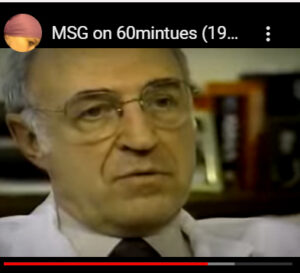
Sections below taken in part from the obituary of John W. Olney posted at Washington University in St. Louis, THE RECORD.
“John W. Olney, MD, the John P. Feighner Professor of Psychiatry and a professor of pathology and immunology, died April 14, 2015. He was 83.
“A longtime leader in the Department of Psychiatry at Washington University School of Medicine in St. Louis, Olney remained active in research until the last few days of his life.
“He studied neurotransmitters in the brain and how they can become toxic under certain circumstances. He was the first scientist to propose that when high concentrations of the neurotransmitter glutamate were released from brain cells, the glutamate could overexcite cellular receptors and destroy cells through a process he named ‘excitotoxicity.’”

More than a talented researcher, John Olney was a kind and caring human being. Seeing the dangers posed by use of free glutamate in food, he published articles on the subject and spoke out on the dangers of MSG, putting his reputation and research funding at risk. In 1972 he testified before the Senate Select Committee on Nutrition and Human Needs, warning that ingestion of MSG places humans at risk, with the greatest risk being for the very young. He gave evidence to a National Academy of Science panel organized to determine whether MSG ought to be banned from baby food, only to find that it had been an “industry arranged whitewash” carried out by a group of scientists with almost no experience in neuropathology. In 1991 he was interviewed for the only 60 Minutes segment ever aired questioning the safety of MSG.
In 1993 he gave testimony to the FDA’s review of the safety of monosodium glutamate – and convinced other neuroscientists to join him. Never hesitating to do what he could to stem the tide of the growing use of MSG, he then was a plaintiff in a lawsuit designed to force the FDA to require appropriate labeling of monosodium glutamate when present in food.
“John was truly a unique individual who had an enormous impact in psychiatry and across many scientific and clinical disciplines,” said Charles F. Zorumski, MD, the Samuel B. Guze Professor, professor of neurobiology and head of the Department of Psychiatry. “He was an innovator and a pioneer. Literally, the field of studying glutamate as an excitotoxin, and even the word ‘excitotoxicity’ itself, can be traced to John’s seminal studies in the late 1960s and 1970s. And his most recent work on the effects of drugs on the developing brain has changed how pediatric anesthesia is done.
“Olney came to Washington University in 1964 as a resident in psychiatry and joined the faculty in 1968. He started his medical training at age 28, leaving a job in the U.S. Army to pursue a medical degree when his sister was diagnosed with multiple sclerosis. Born in Marathon, Iowa, Olney earned his bachelor’s and medical degrees from the University of Iowa.
“In addition to working with glutamate, Olney studied the effects of anesthetic drugs, such as ketamine, on the developing brain. He did important and much-cited research into fetal alcohol syndrome, concluding that if a pregnant woman consumed as few as two drinks, the alcohol could cause nerve cells in the fetal brain to die. And Olney found that as the brain continued to develop in the years after a baby was born, anesthetic drugs also had the capacity to do damage. Consequently, he recommended that elective surgery be avoided in very young children whenever possible.
“Olney was a member of the Institute of Medicine of the National Academy of Sciences. He was a recipient of the Wakeman Award for Research in the Neurosciences, the Dana Foundation Award for Achievement in Health and the Lifetime Achievement Award from the Society of Biological Psychiatry.”
Maybe now that it has been demonstrated that excitotoxic glutamate ingested by a pregnant woman will cause brain damage in her fetus and newborn, leading to intractable obesity (the obesity epidemic) and reproductive disorders (the infertility crisis), someone will listen. Adrienne Samuels


You can watch the 60Minutes program questioning the safety of MSG: https://www.youtube.com/watch?v=8bwBfpWT1PU&t=10s